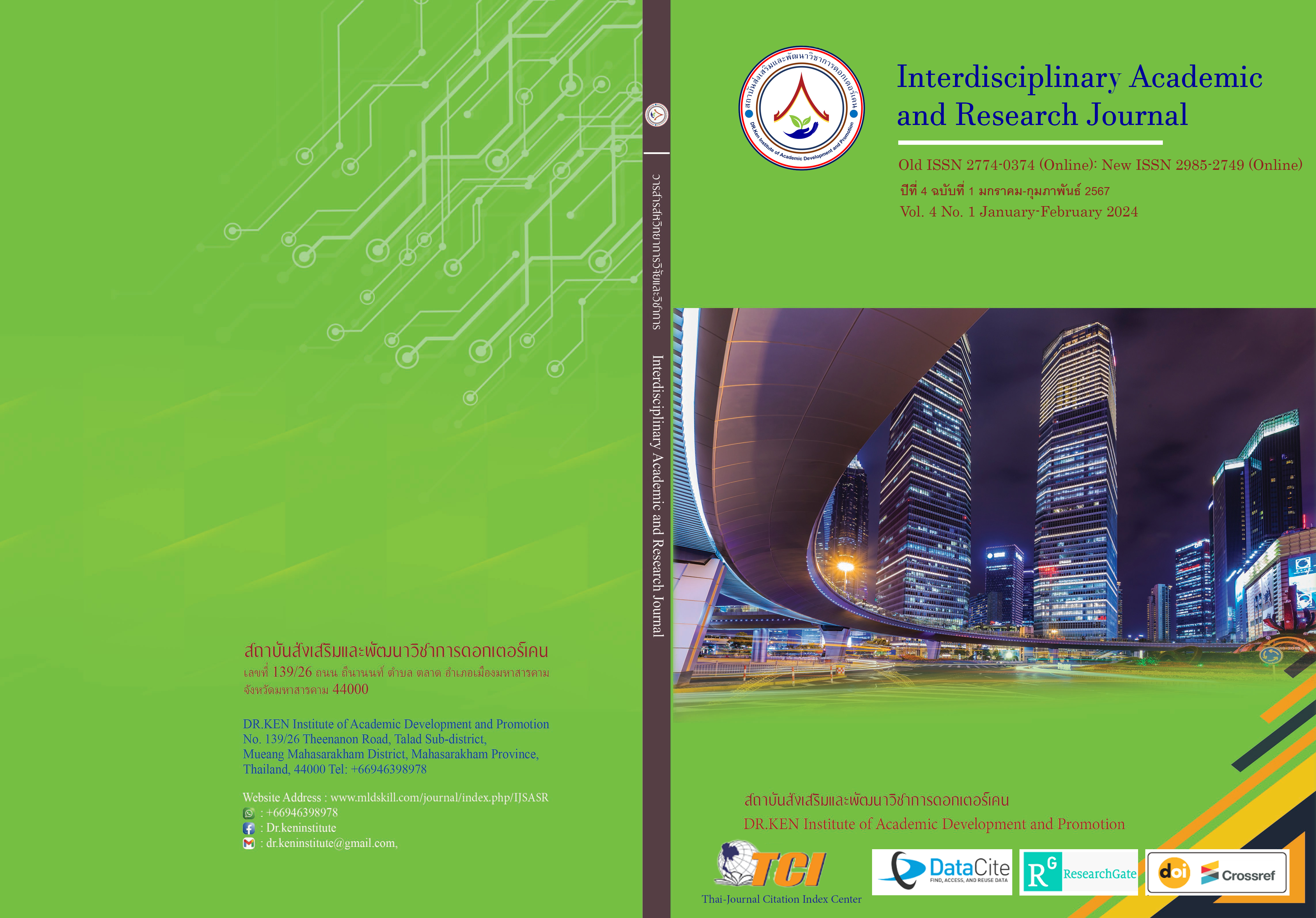The Development System Thinking Skills by Learning Management Used Question-Based Learning (QBL) of Grade 4 Student of Ban Ladtai School
DOI:
https://doi.org/10.60027/iarj.2024.273162Keywords:
Question-based-learning; , Systematic Thinking Skills; , StudentsAbstract
Background and Aims: Education is a crucial factor in driving and developing a country. Nations that advance in the field of education see development in various aspects, including population quality, economy, science, technology, society, and culture. Education should not be limited to the responsibility of a few but should be instilled as a lifelong learning process. The skills of questioning and systems thinking play a significant role in lifelong learning. The purpose of this research is to 1) Study the effectiveness of question-based learning management. 2) Develop systems thinking skills through question-based learning management. 3) Investigate satisfaction with question-based learning management. The research employs action research within a PAOR cycle.
Methodology: The target group consisted of 10 fourth-grade students from Ban Ladtai School in the first semester of the 2023 academic year, selected through purposive selection. The research tools used include 1) A learning management plan on algorithms and problem-solving. 2) A set of activities to develop systems thinking skills. 3) Student behavior observation forms. 4) Systems thinking skills assessment forms and 5) Interview forms for satisfaction with question-based learning management. The data analysis utilized mean, standard deviation, and the efficiency index (E1/E2).
Results: The research findings indicate that: 1) The efficiency index of question-based learning management for fourth-grade students at Ban Ladtai School is 84.13/82.00, exceeding the established benchmark. 2) The development of systems thinking skills after question-based learning management, combined with activities for systems thinking skills on algorithms and problem-solving, showed an average efficiency of 82.00, which exceeds the 60% benchmark and 3) Interview results indicate positive satisfaction among students with question-based learning management regarding the learning environment, teaching methods, and teacher's personality.
Conclusion: The research findings indicate that the learning management approach using questions as a foundation in Grade 4 of Ban Ladad Tai School is highly effective and surpasses the set standards, with a score of 84.13/82.00. Additionally, the development of system thinking skills, coupled with the use of questions as a basis and a set of additional system thinking activities, yielded results exceeding the 60% benchmark, with an average percentage score of 82.00. Furthermore, student satisfaction with question-based learning, as assessed through interviews, revealed positive attitudes towards the learning environment, teaching management, and the personality of the instructors.
References
เกียรติพร สินพิบูลย์ และคณะ. (2561). การพัฒนาความสามารถด้านการคิดอย่างมีวิจารณญาณโดยการจัดการเรียนรู้ด้วยการใช้คำถามเป็นฐานร่วมกับมัลติมีเดียสำหรับนักเรียนชั้นมัธยมศึกษาปีที่ 6. วารสารศึกษาศาสตร์ มหาวิทยาลัยศิลปากร, 16(2), 165-177.
จุฑาทิพย์ หาญกุดตุ้ม, สมภารธัชธรณ์ ศิโลศรีไช และประชัน คะเนวัน. (2566). การคิดเชิงระบบกับการจัดการเรียนรู้โดยใช้คำถามเป็นฐาน. วารสารสหวิทยาการวิจัยและวิชาการ, 3(4), 587-600.
ชัยยงค์ พรหมวงศ์. (2556). การทดสอบประสิทธิภาพสื่อหรือชุดการสอน. วารสารศิลปากรศึกษาศาสตร์วิจัย, 5(1), 7-20.
ทิศนา แขมมณี. (2551). ศาสตร์การสอน. พิมพ์ครั้งที่ 8. กรุงเทพฯ : ด่านสุธาการพิมพ์.
บุญชม ศรีสะอาด. (2545). การวิจัยเบื้องต้น. พิมพ์ครั้งที่ 6. กรุงเทพฯ : สุวีริยาสาส์น.
ประภัสสร สมสถาน. (2564). การหาประสิทธิภาพและผลการใช้บทเรียนสำเร็จรูป เรื่อง คำราชาศัพท์สำหรับพระมหากษัตริย์ หมวดร่างกาย วิชาภาษาไทย สำหรับนักเรียนไทย ชั้นประถมศึกษาปีที่ 4 โรงเรียนนานาชาติยูนิตี้คอนคอร์ด จังหวัดเชียงใหม่. วารสารมหาวิทยาลัยพายัพ, 31(1), 1-14.
พรพิสุทธิ์ มงคลวนิช. (2558). Question-Based Learning (QBL) คืออะไร. Retrieved 22 November 2022, from: https://personality-development-stc.blogspot.com/2015/07/question-based-learning-qbl.html/
พิชญ์สินี เจดีย์รัตน์, สิงหา ประสิทธิ์พงศ์ และอรุณรัศมิ์ วณิชชานนท์. (2563). การพัฒนาทักษะการคิดวิเคราะห์ของนักเรียนชั้นมัธยมศึกษาปีที่ 4 โดยใช้การจัดการเรียนรู้แบบสืบเสาะหาความรู้ร่วมกับเทคนิคการใช้คำถาม. วารสารศึกษาศาสตร์ มหาวิทยาลัยสงขลานครินทร์ วิทยาเขตปัตตานี, 32(1), 61-75.
ฤทัยรัตน์ ชิดมงคล และสมยศ ชิดมงคล. (2560). การคิดเชิงระบบ: ประสบการณ์การสอนเพื่อพัฒนาการคิดเชิงระบบ.วารสารครุศาสตร์,45 (2),209-224.
ศิริลักษณ์ ไทยพงษ์. (2564). การพัฒนาการจัดการเรียนรู้สุขศึกษาโดยใช้ปัญหาเป็นฐานร่วมกับการตั้งคำถามแบบโสเครติสเพื่อส่งเสริมผลสัมฤทธิ์ทางการเรียนและการแก้ไขปัญหาเชิงสร้างสรรค์ของนักเรียนมัธยมศึกษา. ปริญญาครุศาสตรมหาบัณฑิต สาขาวิชาสุขศึกษาและพลศึกษา ภาควิชาหลักสูตรและการสอน คณะครุศาสตร์ จุฬาลงกรณ์มหาวิทยาลัย.
สำนักงานปฏิรูปการศึกษา. (2543). การบริหารเขตพื้นที่การศึกษา : เพื่อคุณภาพการศึกษา. กรุงเทพฯ :สำนักงานปฏิรูปการศึกษา.
องอาจ นัยพัฒน์. (2548). วิธีวิทยาการวิจัยเชิงปริมาณและเชิงคุณภาพทางพฤติกรรมศาสตร์ และสังคมศาสตร์. กรุงเทพฯ : สามลดา.
Assaraf, O., & Orion, N. (2010). System Thinking Skills at the Elementary School Level. Journal of Research in Science Teaching, 47(5), 540-563.
Einstein, A. (1939). The Special & The General Theory. London: Methuen & Co. Ltd.
Downloads
Published
How to Cite
Issue
Section
License
Copyright (c) 2024 SomphanThusthorn SeiloSreechai, Chuthathip Hankuttum

This work is licensed under a Creative Commons Attribution-NonCommercial-NoDerivatives 4.0 International License.
Copyright on any article in the Interdisciplinary Academic and Research Journal is retained by the author(s) under the under the Creative Commons Attribution-NonCommercial-NoDerivatives 4.0 International License. Permission to use text, content, images, etc. of publication. Any user to read, download, copy, distribute, print, search, or link to the full texts of articles, crawl them for indexing, pass them as data to software, or use them for any other lawful purpose. But do not use it for commercial use or with the intent to benefit any business.
















.png)


